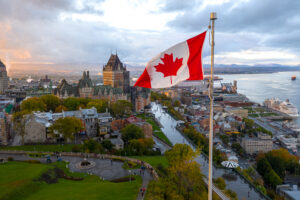Election 44: Battleground Quebec
Analysis provided by MERCURE Conseil
 As the federal campaign rolls on unabated in the “Rest of Canada,” Quebecers for their part have yet to truly tune in. While poll numbers have somewhat shifted in the province, anyone who knows anyone who has been door-knocking over the past week will tell you that the level of awareness remains woefully low. However, this will change on September 2nd with TVA’s Face-à-Face debate.
As the federal campaign rolls on unabated in the “Rest of Canada,” Quebecers for their part have yet to truly tune in. While poll numbers have somewhat shifted in the province, anyone who knows anyone who has been door-knocking over the past week will tell you that the level of awareness remains woefully low. However, this will change on September 2nd with TVA’s Face-à-Face debate.
Quebec has long been touted as a potential kingmaker in this election campaign. At the start, Quebec held the key to a Liberal majority. While the numbers have shifted since then, a strong showing in Quebec is a must-have for the Liberals if they are going to form Canada’s next government, majority or otherwise.
For the Bloc Quebecois, they have finally regained their footing under the leadership of Yves-François Blanchet since 2019. The Bloc’s goal is to solidify its presence in the House of Commons and to win eight more seats, which would bring its tally to 40 MPs. The September 2nd debate will be Blanchet’s time to shine, as he has a better command of the French language than any of his opponents, and a very limited record to defend.
The Conservative Party has positioned itself to at least retain its current seats as they try to gain more seats in the greater Quebec City area. While it may not be perfect, Erin O’Toole’s level of French and his nationalist pitch to Quebecers at least makes him a credible option for some voters. In fact, the agenda he proposes for the province is somewhat “Mulroney-esque,” including greater powers on immigration policy and health transfers with no strings attached. O’Toole will have to be prepared for the TVA debate as it will be his true introduction to a broader Quebec audience for the very first time.
As for the Liberals, their campaign math heading into the election was to hold the seats they have, and try to convert back seats in the suburbs and exurbs around Montreal and in key regions to the Liberals’ win count. For example, Montreal’s South Shore is home to highly coveted seats that could swing between the Bloc and the Liberals. It is no coincidence that Justin Trudeau visited Longueuil as he launched his campaign, and then the riding of Shefford just earlier this week. This Bloc-held riding was won by the Liberals in 2015, and former MP Pierre Breton is hoping to win it back for the Red Team.
Projections about the outcome of a federal election in Quebec have increasingly become more difficult. Values and personalities matter in Quebec politics. Voters may not get overly enthused about a policy proposal, but they will react strongly if they feel kinship to a federal leader. We have observed this phenomenon recently with 2011’s Orange Wave with former NDP Leader, Jack Layton, and to a lesser extent with the resurgence of the Liberal Party in 2015, and the Bloc in 2019.
The campaign in Quebec should be exciting in that we will witness several three-way races with uncertain outcomes. This means that each party’s ground game will matter greatly on election day. For example:
- In recent elections, the Conservative Party has been unable to win close races in Quebec City region, which explains its current seat count of 8 MPs.
- Liberal MP and Treasury Board President Jean-Yves Duclos won his riding with a slim plurality of 325 votes in 2019 and will also be in a fight.
- The urban riding of Louis-Hébert has also been known to provide Election Night excitement, as it has been held by the Tories, the Bloc, the NDP and now the Liberals since 2006.
Once the campaign moves past the September 2nd debate in Quebec, we can expect to see leaders plan even more visits to target seat areas. The vote-rich province’s unpredictable whims make it both a treat to watch for political enthusiasts, and a headache for politicians.
Mercure Conseil is StrategyCorp’s Quebec-based partner, collaborating on cross-jurisdictional strategic engagements at both the federal and provincial levels.